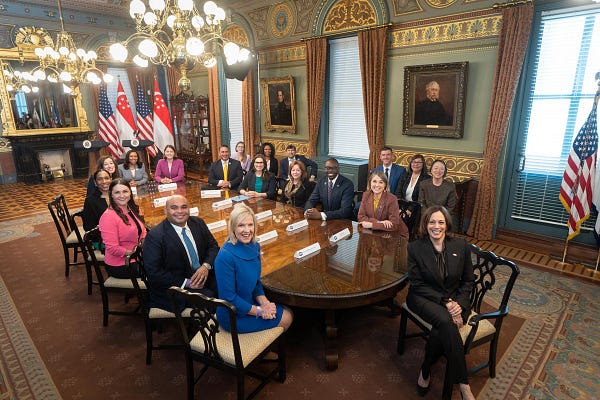The Liftoff: Which candidate loaned their campaign $300,000?
PLUS: Which Oregonian made $179 million last year?; Gov. candidates will debate after all; new polling in CD4; Fagan meets with VP Harris; Death with Dignity back in the headlines; and more!
Welcome back to The Liftoff!
There are some big-ticket items to cover this week, but we want to start by making sure you’re aware of a significant milestone: for the first time in Oregon history, the largest political affiliation is not Democrats or Republicans—it’s non-affiliated voters. Whether you’re conservative or progressive, the trend of growing dissatisfaction with political institutions continues—and it’s something we should all care about.
If you value this newsletter, please become a paying subscriber today. Your support will help us grow and offer more opportunities to this community. It’s just $10 a month!
1. Gomez infuses her campaign with cash; Kotek under the microscope
Jessica Gomez has loaned her campaign $300,000. This vaults her in front in front of several GOP rivals in terms of cash on hand. To learn more about Gomez, check out her interview on The Oregon Bridge.
Let them Debate: While KATU has canceled its primary debates, there will be other opportunities for the candidates to debate. The Portland City Club will host debates for both parties. Timber Unity will host a GOP forum on natural resource issues. The Washington County Democrats will host a forum for the leading Democrats. We’ve also heard rumors that KOIN and KGW may be considering hosting televised debates.
Willamette Week zeroed in on Tina Kotek last week. First, Nigel Jaquiss has a piece on why Kotek hasn’t been able to win the support of some Democrats: Tina Kotek Is Accomplished—and Struggles to Gain Traction With Some Democrats. Why? The article includes quotes from: Kotek, former Gov. Barbara Roberts, former Secretary of State Bill Bradbury, Labor Commissioner Val Hoyle, and these former representatives: Mike McLane, Alissa Keny-Guyer, Jeff Barker, Margaret Doherty, Jules Bailey, and Brian Clem.
But, Kotek had some good news last week, too: She snagged the endorsement of the influential Human Rights Campaign (HRC) organization, focused on LGBTQ+ rights. HRC is a serious player in Democratic politics and could bring with it a network of national donors.
You aren't crazy: more candidates than ever before are running for governor. That includes 20 Republicans and 15 Democrats and doesn’t even count independents or other third party candidates.
The candidates for governor have raised about $15 million combined in this election (Betsy Johnson has raised over three times more than anyone else, with Christine Drazan and Tina Kotek in 2nd and 3rd). They have very different ideas about money in politics, according to The Oregonian.
2. Hoyle is up in CD4; Chavez-DeRemer wins big endorsement
From The Oregonian: here’s why a quarter of the candidates running for congress don’t live in the district they’re running to represent.
CD4: Labor Commissioner Val Hoyle has a strong lead in the CD4 Democratic primary according to a recent poll. She’s at 24%, Doyle Canning is at 8%, and Andrew Kalloch is 4%, with 54% undecided.
CD6: The O has a write-up on all the candidates (in both parties) running in Oregon’s new congressional district. The takeaways: there are no clear frontrunners, many candidates are from outside the district boundaries, and tons of cash will be spent.
CD 5: Former Happy Valley Mayor Lori Chavez-DeRemer has officially received the endorsement of E-PAC which is spearheaded by the House’s highest ranking female official and close Trump ally, Elise Stefanik. The endorsement is a big nab for Chavez-DeRemer who is locked in a competitive primary with businessman Jimmy Crumpacker. The endorsement of E-PAC is likely to unlock significant funding for Chavez-DeRemer.
3. Fagan meets with VP Harris and other state government news


Secretary of State Shemia Fagan joined Vice President Kamala Harris and other lieutenant governors for a discussion on rural broadband.
Russia’s invasion of Ukraine is costing Oregonians millions. Here’s how, courtesy of The O.
The Secretary of State’s Audit Division is calling on the legislature to take action to combat domestic terrorism. Here’s an excerpt: “Only five states — New York, California, Florida, Texas and Washington — experienced more violent extremist attacks than Oregon between 2011 and 2020”.
Attorney General Ellen Rosenblum is rolling out a sanctuary hotline which can be used by any individual who believes there is a violation of Oregon’s sanctuary laws.
Rep. Greg Smith interest in purchasing the Malheur Enterprise gained national traction with a fascinating write-up in the from the prestigious Nieman Lab. Smith offered owner and publisher Les Zaitz $35,000 in cash for the paper. How did Smith make the offer? In the P.S. section of an email.
4. Portland Round-Up: another housing tax clash; Hardesty appears in court; Wyden blasts PDX Saudi-sponsored golf tournament
A political showdown is brewing between the tenant advocate group Community Alliance of Tenants and the Portland Business Alliance:
The Community Alliance of Tenants is pushing an “Eviction Representation for All” ballot initiative, which would create a 0.75% capital gains tax to provide legal representation to tenants on the verge of eviction.
PBA and the business community strongly oppose the measure.
Portland Commissioner Jo Ann Hardesty appeared in court to settle $16k in credit card debt with Bank of America.
Portland’s Charter Review Commission is recommending massive changes to the structure of Portland city government; their proposal will head to a ballot measure.
In other city council news, commissioners voted unanimously to extend housing emergency measures for at least another three years.
Portland Mayor Ted Wheeler was featured in an interview with WW focusing on public safety, city budgets, and Wheeler’s new plan to hire 200 police officers.
Golf Drama: From The O: “Oregon Sen. Ron Wyden decries Saudi-backed golf tournament planned for Portland area: ‘Selling out integrity for profits’”
Wyden blasted the decision to host the tournament at the Pumpkin Ridge Golf Club, saying the industry was “selling out integrity for profits.”
5. Oregon ends residency requirements for physician assisted suicide
Oregon will no longer enforce a residency requirement for its “Death with Dignity” program, sometimes called physician-assisted suicide, following a lawsuit challenging its constitutionality.
The “Death With Dignity Act” passed in 1997; Oregon was the first state to pass such a law (other states have followed).
The law was challenged all the way to the Supreme Court—which upheld the law in a 6-3 ruling, with three conservative judges dissenting.
Battle lines for this legislation are often drawn along the same lines as the abortion debate: “pro-choice” vs. “pro-life”.
Between The Lines: we’re unlikely to see this issue bubbling up in state campaigns or politics, but it shows Oregon continues to be at the forefront of some of the nation’s most contentious issues around personal choice, including drug decriminalization, legalization of sex work, and more.
6. From ECONorthwest: How do tax policy decisions impact where people live?
Thanks to our friends at ECONorthwest for these graphics and this analysis:
The largest difference in intraregional tax policy in the U.S. exists at the Columbia River in the Portland metro area. Oregon has a sizable income tax and modest consumption taxes, while just across the river, Washington has sizable consumption taxes and no income tax. Lots of people rightly ask: “Do the striking differences in tax policy affect household decisions about where to live?” Many of the same amenities (craft beer, access to the Gorge and coast, etc.) are available on both sides of the river, so households can shop for a mix of taxes and services without compromising on lifestyle.
IRS migration data suggest taxes do shape some locational preferences within the region. Reported net capital gains income is growing faster in Clark County (in Washington, just north of the river) than in Multnomah, Washington, or Clackamas counties (in Oregon; see chart 1). And net migration—as measured by adjusted gross income—has consistently moved in Clark County’s direction (chart 2). A big question: will recent local government tax increases on the Oregon side exacerbate these longer-standing trends?
Another question: how troubling are the Portland-area dynamics, and does the outmigration spell trouble for the state budget? Step back to the state level, and the same IRS data show that outflows to Washington are dwarfed by inflows from California and elsewhere (chart 3). The bottom line: taxes do matter at the northern border, but differential housing prices, along with taxes, probably matter even more at Oregon’s southern border.
7. News round-up: Terrible Tilly, big salaries, and Oregon TikTok influencers
From The O: “Intel says it paid new CEO $179 million last year, but much of it is stock that’s worthless unless shares turn around”
Oregon Ducks basketball player Sedona Prince scored profile interview in the Wall Street Journal highlighting her influence on TikTok and inspiring a new generation of female athletes. Prince was first made famous when she filmed a video comparing the lackluster women’s workout room to the men’s at last years NCAA tournament.
Every been interested in buying Terrible Tilly? You’re in luck — it will only cost you a meager $6.5 million.
Reed College students have continued to occupy a building on campus calling for the ouster of a professor who appears to make discriminatory remarks to a drive-thru fast food worker.
Oregon City police are rolling out a “Safe Exchange Zone” which will be a designated area where individuals can conduct private “transactions” in a public sanctioned space. This will be Oregon’s first safe exchange zone.
Nearly 22% of residents in Jackson and Josephine county said they’ve considered moving because their internet is so bad according a recently released survey.
Oregon’s chip industry task force met with leaders at Intel last week. This meeting comes off recent news of Intel’s $20 billion investment in the state of Ohio.
Thank you for reading.
Tips? Feedback? Ideas? Corrections? We want to hear from you! Email benjaminwbowman@gmail.com.
If you value this newsletter, please become a paying subscriber today. Your support will help us grow and offer more opportunities to this community. It’s just $10 a month!
Interested in advertising with us? Get in touch!
About the Authors
Ben Bowman is the chair of the Tigard-Tualatin School Board and a Democratic candidate for Oregon House District 25 (Tigard and Beaverton). In his day job, he works for the Oregon Department of Education. Previously, he worked as a legislative aide for former Reps. Margaret Doherty and Val Hoyle. He also co-hosts The Oregon Bridge podcast. In the newsletter and podcast, he speaks only for himself.
Alex Titus is a small business owner and consultant to businesses, nonprofits, and associations. Previously, he served as an Advisor in the Trump Administration and as a Policy Advisor to President Trump’s Super PAC. His writing has appeared in National Review, Fox News, The Hill, RealClearPolitics, and other publications. He also co-hosts The Oregon Bridge podcast.












